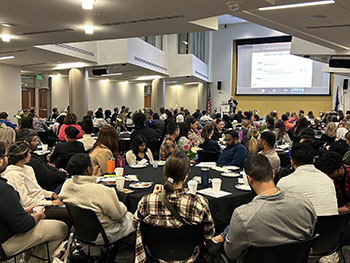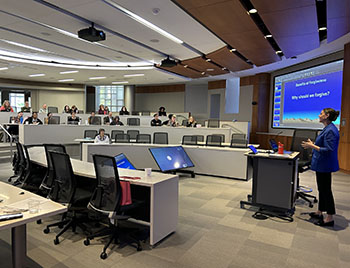
A standing-room-only crowd gathered inside the William D. Johnston and Ronda E. Stryker Auditorium in October for a comprehensive event focused on emotional, physical, financial, and professional well-being.
The fourth annual WMed Well-Being Promotion Symposium was held Thursday, October 9, 2025, at the W.E. Upjohn M.D. Campus in downtown Kalamazoo. The event, which was free and open to the public, featured a variety of workshops covering important topics ranging from forgiveness and stress management to trauma survival and multitasking as a healthcare professional.
“It was an honor to serve as chair of the fourth annual Well-Being Promotion Symposium at WMed,” said Surangi Pradhan, interim vice president of People and Culture at WMed. “We welcomed around 200 participants — including students, faculty, staff, residents, fellows, and community members — for a day of insightful and inspiring engagement centered on well-being. A special highlight this year was the presence of therapy dogs, who brought comfort and stress relief to attendees, quickly becoming one of the most beloved additions to the event.
“The goal of this symposium is simple but essential: to raise awareness, share knowledge, and spark meaningful conversations around the many dimensions of well-being,” Pradhan added. “Over the years, this event has grown into an impactful space dedicated to promoting resilience and holistic well-being in all areas of life — personally, professionally, and as a community.”
Attendees at this year’s symposium heard kickoff remarks from Pradhan and WMed Dean Robert G. Sawyer, MD.
The morning keynote address — “Inflammation and its role in depression and suicidality” — was presented by Lena Brundin, MD, PhD, professor in the Department of Neurodegenerative Science at the Van Andel Institute.
Dr. Brundin outlined her research findings to attendees, noting her research team has repeatedly found increased inflammation in patients with suicidal behavior.

“We see the changes in blood, we see it in cerebrospinal fluid, and we have also found it in brain tissue,” Dr. Brundin said. “We and others think that there is a vulnerability to suicidal behavior that’s governed by these epigenetic marks that can be imprinted based on different events in your life, and our new biomarkers, we think, can predict suicide attempt risk over a year. Of course, I say that with a big word of caution because further testing needs to be done to see if that’s really true. But I still think it’s time for the next step, which is mainly treating a suicidal cohort with an anti-inflammatory agent.”
Attendees participated in two separate breakout workshops on October 9, with three options to choose from in each session. The breakout workshops covered a range of important topics, including burnout and building resilience through peer support, trauma survival, financial wellness, and holistic approaches to occupational health, among others.
Attendees also got to hear noontime remarks from Roger Apple, PhD, division chief of the Division of Pediatric Psychology and director of the WMed Pediatric Autism Center, along with Rachel Wasserman, PhD, Rebecca Rausch, PhD, Katherine Tennant Beenen, PhD, Summer Chahin, PhD, and Kathryn White, MA, from the Department of Pediatric and Adolescent Medicine.
Originally launched in 2021 to honor the memory of WMed faculty member Rebekah Sharp, MD, and later also in remembrance of medical student Jae Beckmeyer, the Well-Being Promotion Symposium has evolved to embrace a broader focus on the many dimensions of well-being and resilience.
“A special thank you goes out to the organizing team — Thifa Sligh, Julia Young, and Leslie Puckett — and to our wonderful keynote speakers, breakout session facilitators, and all the WMed volunteers,” Pradhan said. “This important event would not have been possible without their time, dedication, and passion.”
